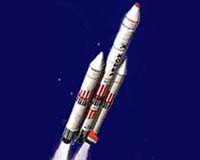 |
Seoul (AFP) Aug 18, 2009 South Korea was Tuesday counting down to the launch of its first space rocket, a move aimed at joining Asia's space race despite protests from rival North Korea. Officials said the rocket partially built by Russia would blast off late Wednesday afternoon, weather permitting, and put into orbit a South Korean-built 100-kilogram (220 pound) satellite. A successful launch from the Naro Space Centre at Goheung, 475 kilometres (300 miles) south of Seoul, will mean the nation has joined an elite club of nine nations which have put a satellite into orbit. Security was tight around the launch site, where about 1,600 police were on guard. The defence ministry said a squadron of fighter jets and an Aegis-class warship would deploy in the area. Wednesday's blast-off has been delayed several times from late 2008 for technical reasons. South Korea has sent 10 satellites into space using launch vehicles from other countries. In November 2007 Seoul announced a plan to launch a lunar orbiter by 2020 and send a probe to the moon five years after that. It unveiled the project one month after China launched its first lunar orbiter and two months after Japan did the same. In April last year Seoul sent its first astronaut into space aboard a Russian Soyuz rocket. It has spent 502.5 billion won (419 million dollars) since 2002 to produce the 33-metre (108 feet) rocket, with the first stage built solely by Russia and the second by local engineers. North Korea, smarting over UN Security Council censure of its own rocket launch in April, has said it will watch closely to see whether world powers also refer the South's launch to the Council. Pyongyang insists it was unfairly punished for its April 5 launch, saying it put a peaceful communications satellite into orbit. Washington and its allies say no satellite was detected in orbit and the North's launch was a disguised test of a Taepodong-2 missile. Seoul has bristled at any comparisons with the North's operation, insisting its launch is purely for scientific purposes. "North Korea is not happy with South Korea acquiring advanced space rocket technology," Baek Seung-Joo of the Korea Institute for Defence Analyses told AFP. But he noted that the South's launch would not cause global concern since Seoul has faithfully observed international accords. Science ministry officials denied Seoul is using Russian technology because Washington refused to transfer know-how. "That's not because of objections from Washington. We picked Russia after comparing price and other terms," a ministry official told AFP on condition of anonymity. He refused to comment on newspaper reports that Russia had been under pressure from Washington to limit technology transfer. However Park Jeong-Joo, director of the Korea Aerospace Research Institute, told journalists in July that Seoul "experienced a lot of difficulties in securing technology cooperation from developed countries". Seoul's closest ally Washington, concerned about a possible arms race in Northeast Asia, has sought to restrict South Korea's missile development. A 2001 accord with the United States bars South Korea from developing missiles with a range of more than 300 kilometres (187 miles). Share This Article With Planet Earth
Related Links Rocket Science News at Space-Travel.Com
 Rocket Marks Milestone In South Korean Space History
Rocket Marks Milestone In South Korean Space HistorySeoul, Korea (Yonhap) Aug 17, 2009 South Korea's first space rocket is expected to mark a milestone in the country's budding space exploration ambitions, which the government says include building a lunar lander within the next 20 years. The Korea Space Launch Vehicle-1 (KSLV-1), set to blast off Wednesday afternoon, has given the country first-hand experience in designing, building and testing powerful space rockets, the ... read more |
|
| The content herein, unless otherwise known to be public domain, are Copyright 1995-2009 - SpaceDaily. AFP and UPI Wire Stories are copyright Agence France-Presse and United Press International. ESA Portal Reports are copyright European Space Agency. All NASA sourced material is public domain. Additional copyrights may apply in whole or part to other bona fide parties. Advertising does not imply endorsement,agreement or approval of any opinions, statements or information provided by SpaceDaily on any Web page published or hosted by SpaceDaily. Privacy Statement |